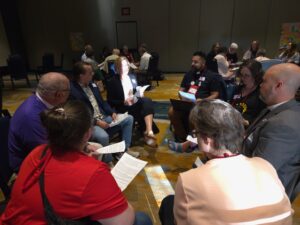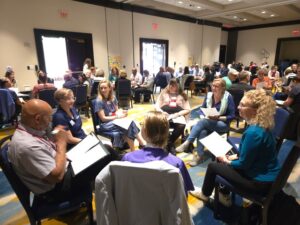Doing the dishes so we can spread the Gospel

At General Convention, it’s not always easy to keep the main thing the main thing. We talk around the edges, spending a lot of time on topics that are not so important or that are important to only a few people. We tend not to spend much time discussing how well we’re doing at the main job Jesus gave his church: the make disciples of all nations.
One of the high points at the convention was a conversation that happened early one morning. For 90 minutes or so, we kept the main thing the main thing. The legislative committee on Congregational Vitality & Data-Driven Initiatives hosted almost 100 bishops and deputies to talk about the challenges our church faces and how to nurture vitality in our congregations.
Speaking of challenges, you might wonder why I have a photo of dirty dishes as the cover photo. Read on, and see how this ties to a provocative quote by our Presiding Bishop-elect of an inspiring saint.
The Rev’d Kelly Steele, Deputy from the Diocese of Georgia and vice-chair of this legislative committee shared with me this letter to the church. Please read it and ponder. And pray for our church!
☩ ☩ ☩
Dear church,
As our Presiding Bishop-Elect Sean Rowe said, quoting Dorothy Day, “‘Everyone wants a revolution but nobody wants to do the dishes.’ Church, we need to do the dishes.” The mission of God, the Great Commission, church vitality, and redevelopment is the preeminent issue in The Episcopal Church but it doesn’t feel that way when we meet. We have infrastructure for creating contextual liturgies and debating resolutions but we do not yet have churchwide infrastructure for the flourishing of our variety of churches and ministries. The Episcopal Church endeavors to be a people of faithful inclusion, welcome, and forward-thinking theologically, but has not demonstrated that forward-thinking with its agendas, governance, and structure. In short, we’ve not been doing our dishes and focusing on reversing atrophy.
The Committee on Congregational Vitality & Data-Driven Initiatives from the 81st General Convention of The Episcopal Church wished to move beyond mere legislation toward experimentation at our meeting in Louisville, KY. We began to model the changes we wish to see in the church. We used the rare opportunity and precious time with so many other invested Episcopalians to pray, dream, and begin work on church vitality in person. Rather than merely legislating or lobbying others to do this work we wanted to incubate what is needed within The Episcopal Church more broadly and General Convention specifically.
- Could we begin to “do the dishes” at #GC81?
- How can our structure serve God’s mission and not the other way around?
- Could we test a Spirit-driven way of governing?
- Could we demonstrate how The Episcopal Church could balance inclusion, hope, truth-telling, tasks and relationships in meetings but still make progress and focus on the Great Commission?
- “Yes,” our conversation on June 24th suggests.
- “Doing our dishes” involves answering these questions and addressing issues therein:The Episcopal Church is at its best when…
- God wants the Episcopal Church to exist and thrive because…
- Something that keeps me up at night (about The Episcopal Church) is…
- When I envision The Episcopal Church 50 years from now, I see…
- We need to…to realize our potential.
- We need to stop…to realize our potential.

Deputies and bishops in conversation
You can read our insights, hopes, and dreams, collected and summarized by artificial intelligence here.
We were not surprised by the results, but heartened by how aligned they were with groundswell discussions around the church. We wish for this conversation to be had churchwide, as well as analysis and usage of data about our condition.
Below you’ll find the invitation, overview, and results from our in-person workshop based on the tools from The Rev. Dr. Eric Law from the Kaleidoscope Institute (more information can be found here). Law’s facilitation techniques account for cultural and communication differences through RESPECT Guidelines and Mutual Invitation as well as Kaleidoscope Bible Sharing (much like African Bible Study, Community Bible Study, and/or lectio divina). Explanations for these methods can be found in Holy Currencies and Law’s many other books.
What is next?
- Hopefully, the Committee on Planning & Arrangements can see the benefit of this dialogue topic and facilitation model for planning the 82nd General Convention in Phoenix, AZ, and beyond. Could we create a non-anxious time for deputies, alternates, bishops, and visitors to pray, discuss, discern, and read scripture together to focus on God’s mission in every General Convention? Could every agenda at the General Convention, Executive Council, the Domestic and Foreign Missionary Society engage those questions above? We think so.
- The Committee on Congregation Vitality & Data-Driven Initiatives was referred several resolutions in Louisville, KY (i.e. A044, A158, D044) that each have urgent concerns for the wellbeing and growth of the church, whether through church planting, redevelopment, or faithful use of church properties, probably our largest tangible asset. We have consolidated these concerns into an omnibus resolution, A044, hoping it will raise awareness and galvanize support using the typical legislative process.
- Every person on the Committee agreed to carry home to their contexts these concerns. We ask everyone who is reading this to do the same. There is not one answer, it will take each one of us and our concerted effort to recenter on the Great Commission and its structural support. Make the Great Commission a focus of your local ministry, your diocesan conversations, provincial meetings, and churchwide work, from which our justice work and structural changes can flow.

Bishops and deputies in conversation
It is the opinion of the Committee on Congregational Vitality & Data-Driven Initiatives from the 81st General Convention that if, as a Church, we do not prioritize church mission and vitality efforts and help to effectively resource them across the church and various parachurch organizations, all our efforts to be faithful to God’s mission will falter. For such an initiative to succeed, the Church needs clear and focused leadership from our Presiding Bishop, President of the House of Deputies, and all others in church-wide leadership at every level. The work must be done through faithful staffing, reworking governance structures, convening stakeholders, and/or establishing new organizations and initiatives for these tasks, not neglecting the truth-telling and repentance needed to right wrongs and move forward. Additionally, better data collection and analysis are needed to help the church know its condition, where there is flourishing, growth, and decline, and how to learn best practices and adapt to our moment. Our hope is that we are now willing to ask tough questions, face the facts, and get creative in this time of transition, a time ripe for collaboration, strategic visioning, and planning for God’s mission.
Sincerely yours,
Committee on Congregational Vitality and Data-Driven Initiatives
From the 81st General Convention of the Episcopal Church
—
Postscript:
The invitation we offered was:
Are you someone who seeks conversation and action for reinvigorating The Episcopal Church at the local, diocesan and/or churchwide levels? Do you seek or know of ways The Episcopal Church can do more than survive but thrive and model a healthy, sustainable, missional, and just organization? If so, come join the Committee 8 on Congregational Vitality and Data-Driven Initiatives for a facilitated conversation on Monday, June 24 at 7 am – 9 am in the Kentucky Ballroom of the Louisville Marriott Downtown to do just that! We wish to use the rare opportunity to gather Episcopalians at the 81st General Convention to pray, dream, and act together for our church’s thriving, see our agenda here: https://tinyurl.com/GC81convoguide. Please RSVP so we can accommodate everyone and their needs as best as we can: https://tinyurl.com/RSVP81. Please consider some ground rules for our time together.
We will:
- welcome anyone at GC81 to participate
- uphold group norms with an intercultural lens (RESPECT Guidelines by Eric Law)
- do our best to accommodate everyone
- invite everyone to share constructively
- pray and do Bible study together
- offer written and verbal reflections
- encourage organic connections
- release the outcome to the Spirit
- offer groundswell learnings to the presiding officers, General Convention and Executive Council
We will not:
- Entertain harmful, shaming, or blaming behavior or language
- Force anyone to share
- Allow anyone to dominate the group
- Succumb to despair
- Limit possibilities
- Break our group norms
For surely I know the plans I have for you, says the Lord, plans for your welfare and not for harm, to give you a future with hope. (NRSV, Jer 29:11)
Photo by Scott Umstattd on Unsplash